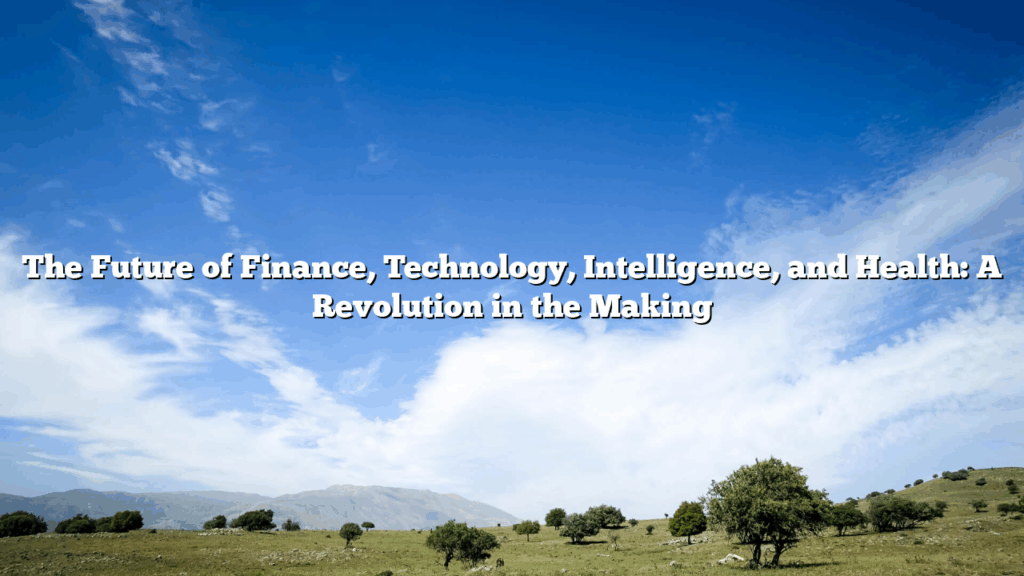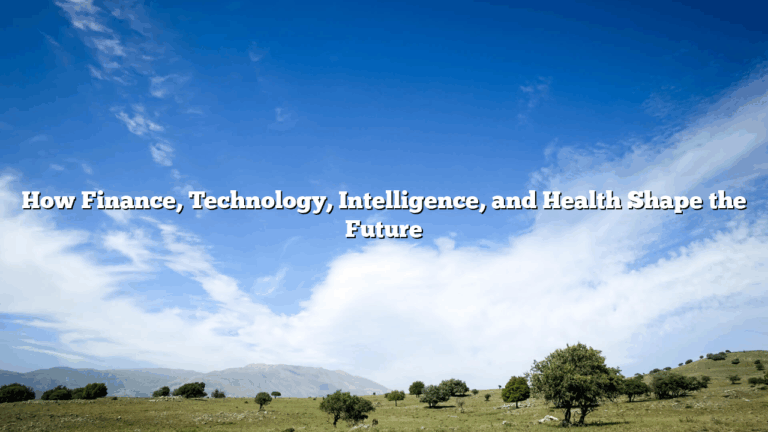
The Future of Finance, Technology, Intelligence, and Health: A Revolution in the Making
In recent years, the world has been undergoing significant changes, with advancements in various fields such as finance , technology , artificial intelligence , and public health. These sectors have become increasingly interconnected, creating a revolutionary impact on how we live, work, and communicate on a daily basis. This article explores the future of these domains and how they shape the world around us.
The Evolution of Finance in the Digital Age
Finance, one of the most essential aspects of modern life, has seen remarkable advancements thanks to the introduction of new technologies . Traditional banking systems are now being challenged by financial technology solutions, which provide faster, more secure, and accessible options for individuals and businesses alike. Technologies such as blockchain are transforming the way transactions are conducted, ensuring greater transparency and reducing fraud risks.
Cryptocurrencies, such as Bitcoin and Ethereum, have emerged as decentralized alternatives to traditional currency. These digital assets are gaining popularity due to their potential for high returns and their ability to offer financial services to the underbanked population. Moreover, machine learning-based investment platforms and robo-advisors are revolutionizing wealth management by making investing more accessible and personalized.
The integration of AI and machine learning in finance allows for better risk assessment, fraud detection, and financial planning. Additionally, data-driven trading has become a staple in modern finance, allowing traders to make faster and more informed decisions. As financial institutions and investors embrace these cutting-edge technologies, the financial landscape is becoming more dynamic and competitive.
The Role of Technology in Modern Life
Technology continues to evolve at a exponential rate, transforming every facet of our lives. The advent of the internet, smartphones, and artificial intelligence has created new opportunities for individuals, businesses, and governments to collaborate on an unprecedented scale. The rise of the Internet of Things (IoT), connected devices, and 5G networks is further driving the technological revolution.
AI and machine learning have made significant strides in various industries, including healthcare, education, and manufacturing. In healthcare, for example, AI algorithms are being used to analyze medical data, predict disease outbreaks, and improve patient care. In education, personalized learning platforms powered by AI are revolutionizing the way students learn, providing tailored experiences to help them succeed.
Moreover, advancements in robotics and automation are transforming industries such as manufacturing and logistics. The use of robots in factories has improved production efficiency, while autonomous vehicles are expected to revolutionize the transportation sector. The continued development of quantum computing promises to unlock new possibilities in problem-solving and data processing, enabling faster and more efficient computations.
The Rise of Artificial Intelligence
Artificial intelligence (AI) has made significant strides in recent years, bringing us closer to the possibility of machines that can think and learn like humans. AI systems, particularly those based on deep learning, are capable of recognizing patterns, making decisions, and solving problems in ways that were once unimaginable. This progress has led to the creation of self-driving cars, smart assistants, and even AI-powered creative tools.
samosir88 daftar learning, a subset of AI, is particularly impactful in fields like healthcare, where it is being used to interpret medical data and diagnose diseases. AI algorithms are being trained on vast datasets of medical images, enabling doctors to identify conditions like cancer, diabetes, and heart disease with enhanced accuracy. This technology is not only improving patient outcomes but also helping to reduce healthcare costs by optimizing resource allocation.
In the realm of business, AI-powered systems are being used to streamline operations, enhance customer service, and improve decision-making. Chatbots and virtual assistants are providing 24/7 support, while predictive analytics help businesses forecast trends and make data-driven decisions. Furthermore, AI is being leveraged to enhance cybersecurity by detecting potential threats and vulnerabilities in real time.
The fusion of human and artificial intelligence is paving the way for a new era of innovation, where machines work alongside humans to tackle complex problems. However, the rise of AI also raises important ethical questions, such as the impact of automation on jobs and the potential for AI to perpetuate biases. It is crucial for policymakers, technologists, and society at large to address these issues as AI continues to advance.
Health: Revolutionizing Healthcare with Technology and Intelligence
Health and healthcare systems around the world are experiencing a transformation due to technological advancements. Telemedicine, wearable health devices, and AI-driven diagnostic tools are reshaping how healthcare is delivered. The ability to monitor patients remotely, diagnose conditions more accurately, and personalize treatment plans is improving patient care while reducing costs.
Wearable devices such as smartwatches are enabling individuals to track their fitness levels, monitor heart rates, and even detect early signs of health problems, such as irregular heartbeats. These devices are empowering individuals to take charge of their health, allowing for early interventions and prevention.
Moreover, AI algorithms are being used to analyze patient data and predict outcomes, helping doctors make more informed decisions. In addition, AI-powered chatbots and virtual health assistants are providing patients with immediate access to medical advice and information. This technology is not only improving the quality of care but also increasing efficiency within healthcare systems.
The COVID-19 pandemic accelerated the adoption of telemedicine, as patients and healthcare providers sought ways to maintain care while reducing the risk of exposure. Telehealth platforms, which allow for remote consultations and diagnostics, have become a vital tool in ensuring continuity of care. The continued integration of AI and telemedicine is expected to create a more accessible and efficient healthcare system.
Furthermore, advancements in genomics and personalized medicine are paving the way for treatments tailored to an individual’s genetic makeup. This approach promises to enhance the effectiveness of therapies and minimize adverse effects, revolutionizing how diseases are treated.
Embracing the Future of Finance, Technology, Intelligence, and Health
As we look to the future, the intersection of finance, technology, intelligence, and health will continue to shape the way we live, work, and interact. The rapid advancements in these fields are creating new opportunities for innovation, economic growth, and improved quality of life. However, these advancements also come with challenges, such as data privacy concerns, ethical dilemmas, and the potential displacement of jobs due to automation.
To fully harness the potential of these technologies, it is essential for governments, businesses, and individuals to work together in fostering responsible innovation. By embracing these changes while addressing the associated risks, we can create a future where technology improves the lives of people worldwide.
In conclusion, the convergence of finance, technology, intelligence, and health presents a unique opportunity for creating a more interconnected and prosperous world. By understanding and navigating these changes, we can unlock new possibilities for human progress and pave the way for a brighter future.



